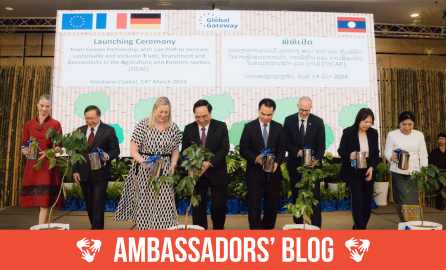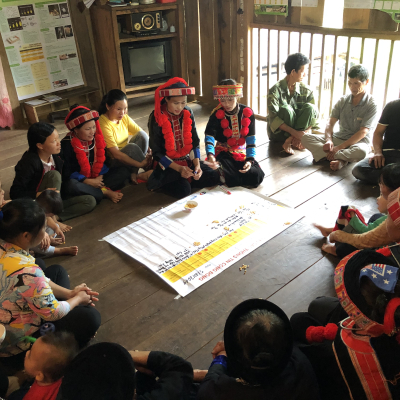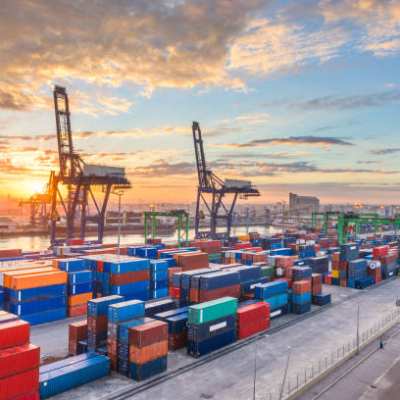The European Union's Global Gateway Strategy stands as a beacon of ambitious commitment, aiming to bridge the global investment gap through a values-driven, transparent approach to infrastructure development. This initiative isn't just about developing and financing infrastructures; it's about laying the foundations for a future that resonates with the United Nations’ Agenda 2030, the Sustainable Development Goals, and the Paris Agreement. With a substantial budget to be mobilised of up to €300 billion by 2027, the Global Gateway brings together the EU, its member states, and a plethora of development institutions to not only leverage investments but also ensure these ventures bring enduring benefits to local communities, with their needs and strategic interests at the forefront.
The fundamental role of civil society
Civil society is an integral part of the Global Gateway. The strategy is built upon the pillars of democratic values, good governance, and equal partnerships, underscored by a commitment to a human rights-based approach. This commitment ensures that the EU takes a transparent approach to its investments across sectors such as digital, climate, energy, transport, health, and education and involves communities as key stakeholders, thereby empowering the voices of those most impacted by these projects.
In the words of Camilla Lombard, Deputy Head of Unit of Directorate General for International Partnerships (DG INTPA)' Unit G2, dealing with Local Authorities, Civil Society Organisations, and Foundations: "In the spirit of the Global Gateway, we are committed not just to building infrastructure but also fostering partnerships that are rooted in democratic values and transparency. Involving civil society stakeholders is a win-win.” It’s all about effectiveness by:
-
ensuring quality investments that go the extra mile and meet the needs of communities over the long term;
-
ensuring that key stakeholders are heard;
-
involving civil society, which is essential for the legitimacy and success of Team Europe’s initiatives.
Recognising the pivotal role of civil society, the EU is actively enhancing its engagement mechanisms. The recently established Global Gateway Civil Society and Local Authorities Advisory Platform exemplifies this commitment. It aims at fostering a more inclusive, participatory process in implementing the Global Gateway strategy. Moreover, the ongoing collaboration between INTPA G2, in charge of Local Authorities, Civil Society organisations and Foundations, with other INTPA units and EU Delegations to review and update guidance on civil society engagement, represents a significant effort towards weaving the voices more cohesively into EU cooperation and external relations.
As we delve deeper into the research aspect of this engagement, our focus sharpens on evaluating the current policies and practices surrounding civil society involvement. While there's a unanimous commitment to sustainability standards that advocate for civil society engagement, the depth and breadth of this engagement can vary significantly.
Our attention particularly focuses on major financing partners like the European Investment Bank (EIB), the European Bank for Reconstruction and Development (EBRD), Agence Française de Développement (AFD), and KfW (Kreditanstalt für Wiederaufbau), given their substantial financial contributions and notable importance in key sectors or regions of the Global Gateway. Through a meticulous analysis framework, we're examining these partners' strategies for engaging with civil society at both strategic and project levels. This includes probing into their internal capacity for such engagement, their methods for monitoring and evaluating its quality and impact, the distribution of responsibilities between financing institutions and implementers, and the mechanisms in place for civil society to provide feedback and foster accountability.
Identifying potential gaps
This research is not just about highlighting existing practices; it's about identifying potential gaps in civil society engagement among institutions financing the Global Gateway. We're also casting a lens on the voluntary sustainability and human rights standards used by the private sector, particularly the commitment to meaningful civil society engagement. The ultimate goals are to:
-
identify potential entry points to enhance civil society engagement during project cycles as an integral part of the process;
-
enable civil society actors to bring their expertise and knowledge of local context to contribute to the successful delivery of projects for the communities they represent;
-
and effectively strengthen the identification, execution and outcomes of Global Gateway projects.
Concluding thoughts
As we progress, this in-depth research will serve as a critical tool in shaping practical guidance for INTPA staff both in headquarters and EU Delegations, ensuring civil society's engagement in the Global Gateway rollout, building on the achievements of the three generations of Roadmaps for engagement with Civil Society, which continue to play a pivotal role in shaping EU strategies for engagement with CSOs.
By identifying emerging practices that can be supported and scaled up, this mission paves the way for civil society to transition from mere participants to co-creators of sustainable development initiatives. In this journey towards a more inclusive and sustainable future, the Global Gateway opens new avenues for civil society to engage, influence, and ensure local communities and most vulnerable groups benefit from international development projects.
Photo credit: European Union, 2023





Log in with your EU Login account to post or comment on the platform.
Interesting article, it would be interesting to revisit it in light of the 360 and the Team Europe approach which should have brought more development dividends.